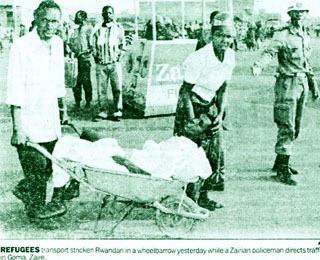
by GENE MUSTAIN in New York and MICHAEL O. ALLEN in Goma, Zaire, Daily News Staff Writers | Wednesday July 27, 1994
Aid workers battling death, famine and pestilence of the Rwanda refugee crisis faced a new problem yesterday–a shortage of graves.
The raging cholera epidemic in the squalid camps near the border backwater town of Goma, Zaire, continued to claim lives faster than mass graves could be dynamited out of the volcanic rock blanketing the area.
 As planeloads of international relief supplies began arriving, burial teams — including a Zairian boy scout troop — collected 2,000 bodies. And aid workers feared that 20,000 may have died since 1.2 million Rwandans fled to Zaire a week ago.
As planeloads of international relief supplies began arriving, burial teams — including a Zairian boy scout troop — collected 2,000 bodies. And aid workers feared that 20,000 may have died since 1.2 million Rwandans fled to Zaire a week ago.
But gravesites were full, and hundreds of rotting bodies were left in foul-smelling piles along the roads. Aid workers held back on announced plans to burn corpes because cremation runs counter to African traditions.
“The burning issue, as it were, is a last resort,” said Ray Wilkinson, a United Nations spokesman. “One problem, as you may guess, is that it’s hard to find anyone willing to undertake the grisly task.”
About 75 American soldiers and a number of civilian experts began operating water purification equipment yesterday, but relief workers fear that thousands more refugees will die before enough equipment is on hand.
“Our top priority is clean water, because without it more people are going to die in droves,” Brig. Gen. Jack Nix said after landing at Goma’s airport.
The equipment can sterilize 2 quarts of water a day for each refugee, but the UN estimates that each Rwandan needs 5 quarts.
The principal water supply, Lake Kivu, is now the principal source of cholera — a virulent form of dysentry — because the lake is filled with human feces and the bodies of Rwandan civil war victims.
The refugees in Goma, most of them Hutu, fled the victorious Tutsi rebels. They feared retribution for the massacre of 200,000 to 500,000 people, mainly Tutsis, by Hutu militias from April to July.
The new Tutsi-dominated government said again yesterdady that the refugees may come home without fear of reprisal. That, and the horrid conditions in the camps, apparently have prompted about 10,000 Rwandans to begin trekking home.
“The long-term strategic solution to this problem is to get the Rwandan government to accept its refugees back,” Lt. Gen. John Sheehan said at a Pentagon briefing.
Militias organized by Rwanda’s ousted Hutu government were intimidating other refugees to stay, said Wilkinson.
About 2,000 U.S. troops are involved in the humanitarian effort, dubbed Operation Support Hope.
With News Wire Services.

2 Comments